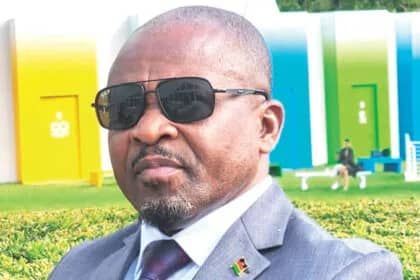By Burnett Munthali
Vice President Dr. Michael Usi, also known for his theatrical persona as “Manganya,” has become a polarizing figure in Malawi’s political landscape. His recent actions and statements have elicited mixed reactions, sparking debates about his political motives, his loyalty to the United Transformation Movement (UTM), and his broader role in shaping the country’s political future. Below is a detailed analysis of the diverse opinions and criticisms surrounding Dr. Usi.
One of the dominant reactions to Dr. Usi’s political maneuvers is the accusation of betrayal towards the UTM. Critics argue that his statements—such as suggesting people love him personally rather than the UTM—undermine the party’s unity and agenda. This perceived self-promotion has led to speculation about his true intentions, with some accusing him of aligning more closely with the Malawi Congress Party (MCP) while still wearing the UTM banner.

The contradiction between advocating for the MCP while donning UTM colors has left many questioning his integrity. Such behavior, critics suggest, creates confusion among supporters and erodes trust within the UTM, potentially destabilizing the party.
A significant portion of the public has gone further, demanding Dr. Usi’s arrest. They accuse him of actions bordering on treason, arguing that his behavior constitutes a betrayal of the UTM’s principles and objectives. These critics believe that if Dr. Usi can allegedly undermine his party, he might not hesitate to betray the country should he rise to higher office.
However, these calls for his arrest have sparked counterarguments, with some viewing them as exaggerated and politically motivated. For instance, some individuals point out the lack of concrete evidence of criminal activity, framing the accusations as part of Malawi’s culture of politically motivated arrests.
Critics have also questioned Dr. Usi’s political acumen and influence. While acknowledging his educational achievements, detractors label him a “political savage,” suggesting that his strategies lack foresight and coherence. They argue that his attempt to mobilize UTM supporters under his influence might backfire, ultimately leading to his expulsion from the party.
Others dismiss Dr. Usi’s ability to garner widespread support, likening his political stature to lesser-known figures like John Chisi. They argue that his appeal is limited and that he would struggle to win against established politicians like Enock Chihana in a direct contest.
Amid these debates, a broader theme emerges about the evolving political landscape in Malawi. Many citizens are expressing fatigue with “chip politics,” characterized by empty promises, propaganda, and personal agendas. This shift in public sentiment suggests that leaders like Dr. Usi may face greater scrutiny and resistance if their actions are perceived as self-serving or divisive.
Despite the criticisms, some voices defend Dr. Usi, emphasizing his role in promoting the UTM brand and his unique approach to politics. His supporters argue that his charisma and unorthodox strategies can be an asset in engaging the grassroots. They also view the accusations against him as exaggerated and driven by political rivals seeking to discredit him.
The reactions to Vice President Dr. Michael Usi reflect the complexities of Malawi’s political environment. While some view him as a disruptor threatening the stability of the UTM, others see him as a misunderstood leader with the potential to redefine political engagement. Regardless of these differing perspectives, one thing is clear: Dr. Usi’s actions and decisions will continue to shape the discourse in Malawian politics, challenging both his supporters and critics to reconsider their assumptions about leadership and loyalty.
Malawi’s political dynamics are indeed changing, and how figures like Dr. Usi navigate this shifting landscape will significantly impact the nation’s future trajectory.


